
When former President Jimmy Carter entered hospice care in February 2023, the world watched a man of profound historical significance choose a path of dignity, peace and humanity for his final chapter. Now with his passing at the age of 100, his experience offers a powerful reminder of the transformative benefits that hospice care can provide — not only for an individual but also for their loved ones.
Hospice care is often misunderstood as “giving up,” but the 39th U.S. president’s choice underscores its true essence: prioritizing quality of life amidst a terminal illness. By opting for hospice care, Carter embraced a plan designed to manage pain, ensure comfort and provide emotional and spiritual support, all while surrounded by family in the familiar and loving environment of his Plains, Ga., home.
Hospice care’s greatest strength is its patient-centered approach. For the former president, this likely meant spending his final days engaged with loved ones and reflecting on a life devoted to public service, rather than enduring what can often be a relentless pursuit of medical interventions. Ostensibly, it allowed him to live his last moments on his own terms, a testament to the respect that hospice care places on individual autonomy.
Equally significant are the broader benefits hospice care offers families. Carter’s extended time in hospice gave his family the opportunity to prepare for his passing emotionally, cherish precious moments and say their goodbyes without the sterile interruptions of a hospital setting. The support provided by hospice professionals, from grief counseling to logistical assistance, eases the emotional toll on caregivers, a vital resource for families navigating the end-of-life journey for a loved one.
Carter’s extraordinary life was marked by his commitment to human dignity, and his hospice experience reflected this same principle. Just as he fought for peace and equity on the global stage, he modeled how individuals can find peace and dignity in dying. His choice challenges the stigma often associated with hospice and shines a light on its potential to transform the narrative of dying into one of meaning, love and acceptance.

















































